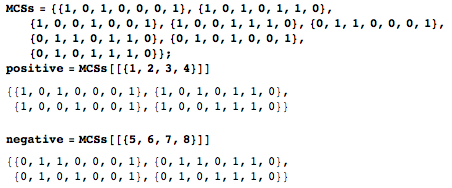I convert here only one term $x_1x_3x_7$ from the binary matrix by first getting the reversed binary 1010001 and then miggling with the data. I know I could convert the columns into binaries and then use solutions here but I feel there must be something builtin: I am trying to convert binary form of multilinear function simply to its symbolic form where the MLF is expressed as a matrix below..
Is there anything built in to convert the binary matrix into the corresponding multilinear function?
Input
Intended output
$x_1x_3x_7+x_1x_3x_5x_6+x_1x_4x_7+x_1x_4x_5x_6-x_2x_3x_7-x_2x_3x_5x_6-x_2x_4x_7-x_2x_4x_5x_6$



